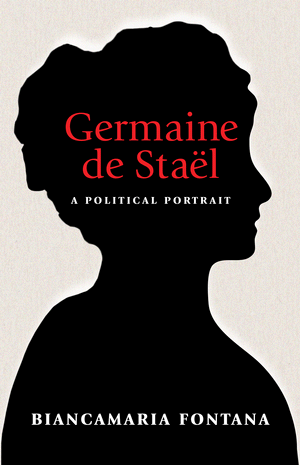As students of Napoleonic history, we are led to Germaine de Stael via the threatened (and threatening) gaze of the First Consul. And yet, perhaps, she more than any of her contemporaries stands for the sort of middle-ground, monarchic politics that Napoleon himself would subsequently embody. In this stimulating study of the crucial decade of de Stael’s work (1790-1800), Biancamaria Fontana describes Germaine’s passion for politics and her fascination for the nature (and power) of public opinion. The later chapters deal in detail with the complex relationship with the post-directorial regime. There is much here for all those interested not only in Madame de Stael herself but also in the beginning of Napoleon’s political career.
PH April 2017
From the publishers:
Germaine de Staël (1766–1817) is perhaps best known today as a novelist, literary critic, and outspoken and independent thinker. Yet she was also a prominent figure in politics during the French Revolution. Biancamaria Fontana sheds new light on this often-overlooked aspect of Staël’s life and work, bringing vividly to life her unique experience as a political actor in a world where women had no place.
The banker’s daughter who became one of Europe’s best-connected intellectuals, Staël was an exceptionally talented woman who achieved a degree of public influence to which not even her wealth and privilege would normally have entitled her. During the Revolution, when the lives of so many around her were destroyed, she succeeded in carving out a unique path for herself and making her views heard, first by the powerful men around her, later by the European public at large. Fontana provides the first in-depth look at her substantial output of writings on the theory and practice of the exercise of power, setting in sharp relief the dimension of Staël’s life that she cared most about—politics. She was fascinated by the nature of public opinion, and believed that viable political regimes were founded on public trust and popular consensus. Fontana shows how Staël’s ideas were shaped by the remarkable times in which she lived, and argues that it is only through a consideration of her political insights that we can fully understand Staël’s legacy and its enduring relevance for us today.
Biancamaria Fontana is professor of the history of political ideas at the University of Lausanne in Switzerland. Her books include Montaigne’s Politics (Princeton), Benjamin Constant and the Post-Revolutionary Mind, and Rethinking the Politics of Commercial Society.
Table of Contents:
Acknowledgments vii
INTRODUCTION: A Passion for Politics 1
CHAPTER 1 Interpreting the Opinion of the Majority of the Nation (1789–91) 11
CHAPTER 2 The View from the Executive (1792) 37
CHAPTER 3 Politics as Propaganda: Defending the Queen (1793) 61
CHAPTER 4 Addressing William Pitt (1794) 84
CHAPTER 5 The Advent of Modern Liberty (1795) 109
CHAPTER 6 Condemned to Celebrity: The Influence of Passions (1796) 132
CHAPTER 7 The Republic in Theory and Practice (1797–99) 158
CHAPTER 8 Raising the Stakes: The Measure of Ambition (1800) 181
CHAPTER 9 Back to the Future: The Bourgeois Liberal Republic 207
CONCLUSION: Germaine de Staël and Modern Politics 233
Notes 237
Bibliography 267
Index 285


